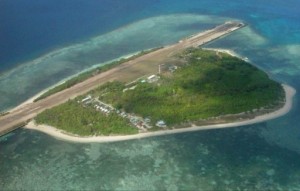
China should withdraw its ships from Ayungin Shoal (Second Thomas Reef) because that area of the West Philippine Sea is an “integral part” of the Philippines’ national territory, the Department of Foreign Affairs (DFA) said Monday, May 27, 2013. AFP/Kayalaan Municipal office
MANILA, Philippines—The Armed Forces of the Philippines (AFP) awarded one of the highest military recognitions to the Marines and sailors who reported and monitored the presence of Chinese vessels at Ayungin Shoal in May, alerting the national government to another encroachment by China on Philippine territory.
The Philippines marks its ownership of the shoal with the Ayungin “detachment,” a rusty hospital ship named BRP Sierra Madre that ran aground on the reef in 1999.
Long-haired, sunburned and malnourished, the soldiers received the Bronze Cross medal from Lt. Gen. Rustico Guerrero, commander of the Western Command, last week, the Inquirer learned from a government source.
“The Bronze Cross is an award given to soldiers who risk their lives but are not in actual fighting, but their lives are in danger,” the source said.
The source, who also provided the photographs to the Inquirer, asked not to be named as the government wants to control information coming from Ayungin Shoal, citing national security.
But the source said the public should know the sacrifices soldiers make and the challenges they face when they are deployed to isolated detachments like the Kalayaan islands in the Spratlys to protect the country’s territory and sovereignty.
Dedication to duty
For the government, the troops led by Marine T/Sgt. Eddie Malate, the most senior of the soldiers, were heroes.
Guerrero has called them the “defenders and protectors of Ayungin Shoal.”
The source said that the citation for the Bronze Cross received by the troops highlighted their “high sense of responsibility and dedication to duty when they vigilantly monitored the persistent presence, movement and activities of another claimant country’s vessels.”
“The reports they dispatched to their commanders allowed our government to assess and respond to the situation,” the source said.
The Ayungin detachment sent reports to Western Command headquarters, which dispatched naval vessels and planes to verify and document the soldiers’ reports.
“This documentation was sent to the national government to support our diplomatic protest,” the source said.
In its protest, the government said the Chinese vessels encroached on the maritime borders of the Philippines.
Chinese harassment
Around the time Malate and the other soldiers spotted the Chinese vessels, Eugenio Bito-onon, mayor of Kalayaan town on Pag-asa Island, was traveling to Puerto Princesa with other islanders in a boat when two huge, unidentified vessels that looked like navy ships with large spotlights appeared and began to trail their vessel.
Bito-onon and his group were passing by Ayungin Shoal when the unidentified ships suddenly showed up.
A document given to the Inquirer quoted Malate as saying that they “saw the Chinese ships moving around their detachment but they did not confront them with hostility.”
“Although the Chinese did not harm them, the persistent display of intimidation from the Chinese maritime surveillance ships had not affected them,” the document said.
“They remained calm and focused on their task to monitor and report what the national government considers ‘illegal and provocative presence,’” it said.
‘We cannot be weak’
Malate said he and the other soldiers on Ayungin Shoal were not afraid of the Chinese in the area.
“Fear is no longer there … We just followed the orders given to us. We cannot be weak because Ayungin is ours,” Malate said.
He said that he and his fellow soldiers in the detachment kept their morale high by reminding one another of their duty to the country.
Malate said they knew the government would not abandon them.
The military last week sent fresh troops and supplies to Ayungin, relieving Malate and his men who were more than glad to set foot on the ground again.
They were treated to ice cream and donuts, the sweets that usually await Ayungin troops after their tour of duty.
Seafood every day
“At Ayungin we eat seafood every day that’s why we miss ice cream and donut. We just talk about these treats there and wait for the day we will eat them again,” Malate said.
The soldiers on Ayungin cook their own food. They grow spices like ginger in pots to have something to spike the flavor of their meals.
The document seen by the Inquirer has a military doctor saying that “most soldiers deployed [to the Kalayaan group on long tours of duty] like [the] Ayungin soldiers tend to suffer from malnutrition and other health-related risks because of the extreme conditions in their environment and the imbalance of nutrients from the food they eat.”
That report prompted Guerrero to order medical checkups for soldiers who had been deployed to Kalayaan.
Hard life
Malate said life on Ayungin was hard, but he had learned to love it.
“It is where I and my comrades found home while protecting our territory. I am proud that I have been assigned here because not everybody can have the honor to perform duties here,” Malate said in the document seen by the Inquirer.
Malate said that the fresh troops now on Ayungin would defend the Philippine territory with the same tenacity as every soldier who had been assigned there.
“Devotion to duty is a binding force among us in the military. We just hope that our countrymen will continue to include us in their prayers for the safety of our troops so we can continue performing our mandate in the [Kalayaan],” Malate said.

